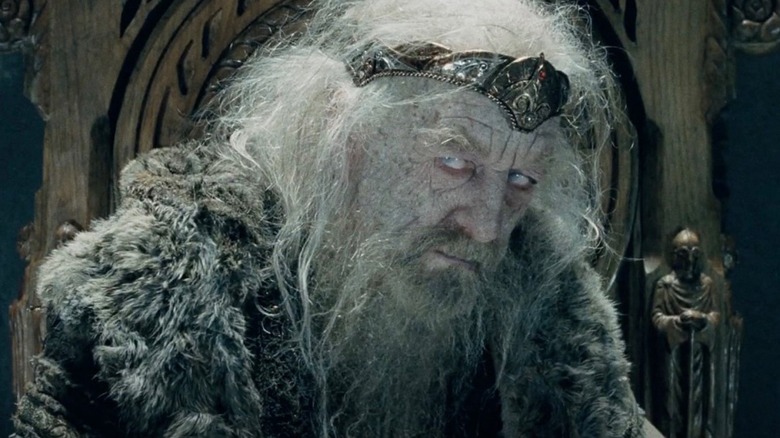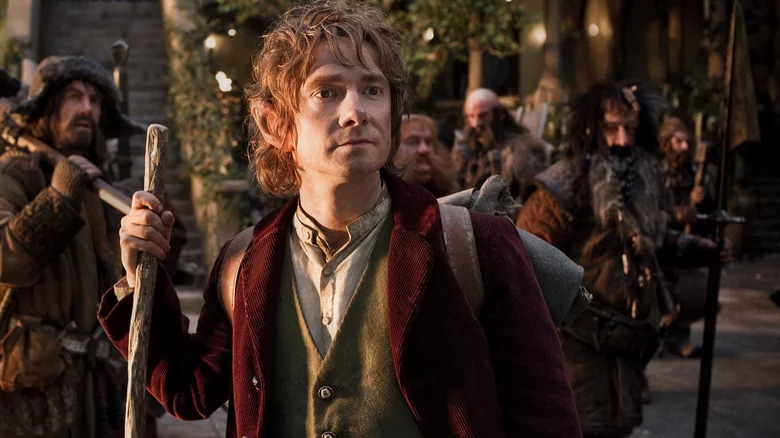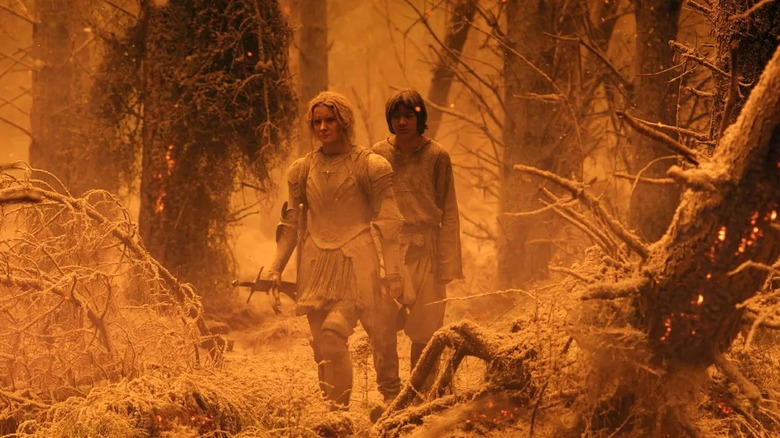Lord Of The Rings Star Bernard Hill Thinks The Rings Of Power Was Made Purely For Profit
Oh, Bernard Hill, Benny, mate. He might have been great in "The Lord of the Rings" trilogy, he might have given one of the greatest movie speeches of all time, and Théoden King may be one of the best characters in a trilogy filled with incredible characters — but why, oh why does he have to publicly share his terrible takes? I know it is very tempting to ask every single person involved with a beloved big movie about the sequel/prequel/reboot they are not involved with, but do you have to? It'd be one thing to ask, say, Hugo Weaving or Cate Blanchett about the new takes on their characters, but Bernard Hill? Rohan isn't even around in the new show! What does it matter what he thinks?
And yet, that didn't stop Metro from asking Hill whether he'd be watching "The Lord of the Rings: The Rings of Power." Unsurprisingly, Hill isn't very interested in watching. "It's a money-making venture and I'm not interested in watching that or being in it. Good luck to them and all that stuff but it's not like the real thing," he replied, arguing that the franchise would be better off had it been left as just the original trilogy.
Hill wasn't done with his scolding hot take, because he also talked about "The Hobbit." Even though the actor agreed with the consensus that those movies were stretched a bit too thin, he also had some surprisingly nice things to say. "They did it well — they did it really, really well," Hill said. "They expanded it [but] I think you can only stretch a piece of elastic so far. I think they managed it in 'The Hobbit' because there were some really good things in 'The Hobbit' without a doubt."
All movies are made for profit
Now, every movie and TV show is made as a money-making venture, that's just how the business works. "The Lord of the Rings" trilogy wasn't made for charity, after all, and it wasn't made as a favor to the Tolkien family because they were desperate for an adaptation. Yet those films were still magnificent, because they were made with care, artistry and craft, despite endless conflict with executives that ended with elaborate orc-shaped revenge.
Likewise, "The Hobbit" was definitely a trilogy made for profit: a cash-in on the success of its predecessor, and a trilogy with endless problems, studio interference and a case of too many cooks in the kitchen competing for their share of the profit. That being said, there was definitely some merit to the "Hobbit" movies. The first did a rather good job of marrying the expectations of a "Lord of the Rings" prequel with the whimsical tone of the original book, and even included some delightful musical numbers.
And yet, to accept the validity of that project while outright rejecting "The Rings of Power" simply because it had a gigantic budget makes no sense. Is it because of Peter Jackson being in the director's chair? Because that wasn't the plan when the "Hobbit" movies began development, and Jackson himself said that he was rushed into production without enough prep work, leaving him "winging it" for most of the shoot.
Don't miss out on a great show
Of course, it is entirely reasonable to question the raison d'etre of any project, particularly reboots and sequels made years after the first one. But to just reject them all without giving them a try would make you miss out on such gems as "Top Gun: Maverick" or "Cobra Kai," two legasequels that no one asked for, yet managed to deliver thrilling new tales while capturing what made the originals great in the first place.
As for "The Rings of Power" — sure, it does have an absurd budget. Sure, we know the entire endeavor was driven by money and a desire to cash in on the post-"Game of Thrones" fantasy TV void. But that doesn't mean the show didn't make the best out of a bad situation and deliver a great season of TV. After all, "The Rings of Power" was the rare adaptation that actually translated Tolkien's anti-war themes and beliefs to the screen; one that included Tolkien's Catholic guilt and his sense of doom and gloom. Granted, we didn't have to spend the entire season on two unnecessary mysteries of identity, but that's a small price to pay to see the fall of the Two Trees of Valinor, the beginning of the fall of Númenor, and the creation of Mordor on the screen.
There are valid reasons to not be interested in "The Rings of Power," but to call it a money-making venture like it's something rare in Hollywood, and to miss out on an achievement almost as monumental as the original "Lord of the Ring" movies is a disservice, even if it comes from Théoden King himself.


